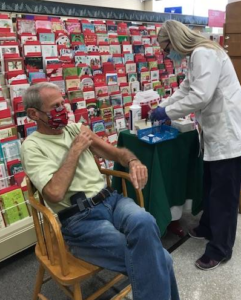Hesitant healthcare workers, latest hot supplement, frog poison antics, and more
05 Jan 2021
Posted by Andrew Kantor
Let’s do the Covid-19 bullet points
So many numbers — deaths, hospitalizations, positive tests — which one will tell you whether the pandemic is getting better or worse? Hospitalization counts, says the Covid Tracking Project, because it’s the one metric not affected by testing slowdowns or reporting delays.
* * *
In Georgia: As of January 3 there were 4,921 hospitalized with Covid-19 — that’s about 30.5 percent of all hospitalized patients … and 20 percent higher than the previous week.
Scary:
Today, 89.8% of the state’s ICU beds are full. As of yesterday’s HHS Community Profile Report, 41% of those beds are held by a COVID-19 patient, nearing half of all ICU beds in use.
* * *
Georgia adds more people to “you can get the vaccine” list: people aged 65 and older, law enforcement officers, firefighters, and first responders are now on the list. (It previously only included healthcare workers and staff and residents of long-term care facilities.)
Here’s GPhA’s Jeff Lurey getting his from pharmacist (and GPhA past president) Pamela Marquess:

That in mind, county health departments in North Georgia are switching their focus from testing to vaccinations.
Beginning January 11, testing will be offered at health departments in Fannin, Gilmer, Murray and Pickens counties Monday through Friday between 8:00 AM to 9:00 AM for symptomatic first responders, school employees and court staff.
In Cherokee and Whitfield counties, COVID-19 testing will continue to be provided to anyone who needs it Monday through Friday from 8 AM to 11 AM, but by appointment only. To make an appointment for testing in Cherokee and Whitfield counties, call 1-888-881-1474.
* * *
Outpatient antibody treatments, which can work well for Covid patients, have been sitting unused — they’re not FDA-approved for Covid-19, and they take time and effort to administer (not good for overwhelmed hospitals).
But now dialysis centers are stepping up to give them — which makes sense, because their patients are among the highest risk (and dialysis centers are also perfectly equipped for that kind of outpatient procedure.
* * *
Hesitancy: A lot of frontline healthcare workers — we’re talking 29 percent — are hesitant about or outright refusing the vaccines. Why? Fears of it having been rushed, lack of testing on Black and Hispanic people, and distrust of the government.
Ironically, those frontline workers are disproportionately people of color — a group most at risk from the virus, but also one with memories of “past atrocities, such as the unethical surgeries performed by J. Marion Sims and the Tuskegee Syphilis Study.”
* * *
Trust the long-haulers: A lot of people who recover from the coronavirus find themselves experiencing a host of nasty symptoms, from breathing trouble to “brain fog.” No one is quite sure what’s up with these “long haulers,” but healthcare pros are being told clearly not to dismiss these complaints. Clearly something is going on.
How the problems play out in different people is unpredictable, doctors say, with some gradually getting better and others not. Multiple organs are involved, so multiple biological mechanisms might be at play.
The latest way to live forever
If you’re already taking vitamin D and drinking three to four cups of coffee a day, you might want to add glucosamine/chondroitin to your daily regimen.
West Virginia University researchers found that …
…individuals who took glucosamine/chondroitin […] on a daily basis for at least 1 year saw a 39% reduction in mortality from all causes of death and a 65% reduction in the likelihood of death from cardiovascular disease.
This was an epidemiological study, not a clinical trial, so don’t read too much into it yet. But still, worth a mental note.
Medicare pricing change won’t be coming anytime soon
Remember the administration’s plan to tie Medicare reimbursements to certain drugs to what other countries are paying? It’s hit a speed bump, with the U.S. District Court of Maryland issuing a 14-day injunction.
Why? “The rule was promulgated based on an executive order, not a congressional act, and standard notice and comment procedures were not followed.”
There are no words
- Obtain poison from the poisonous giant monkey frog, native to Brazil.
- Burn several dots into patient’s skin with hot embers.
- Scratch the burns and put the poison on it, for rapid absorption.
- Watch as patient immediately begins to experience “nausea, vomiting, diarrhea, sweating, and fevers” along with “dehydration, seizures, and delirium.”
- Profit.
It’s called kambo, and it’s the newest craze in — you guessed it — California (and elsewhere).
It’s been touted to help ailments such as depression, chronic pain, hypertension, migraine headaches, thyroid disorders, diabetes, and alcohol addiction.
But…
Those who’ve experienced it describe it as one of the worst experiences of their lives, while, at the same time, they also voice plans to undertake the experience again.


